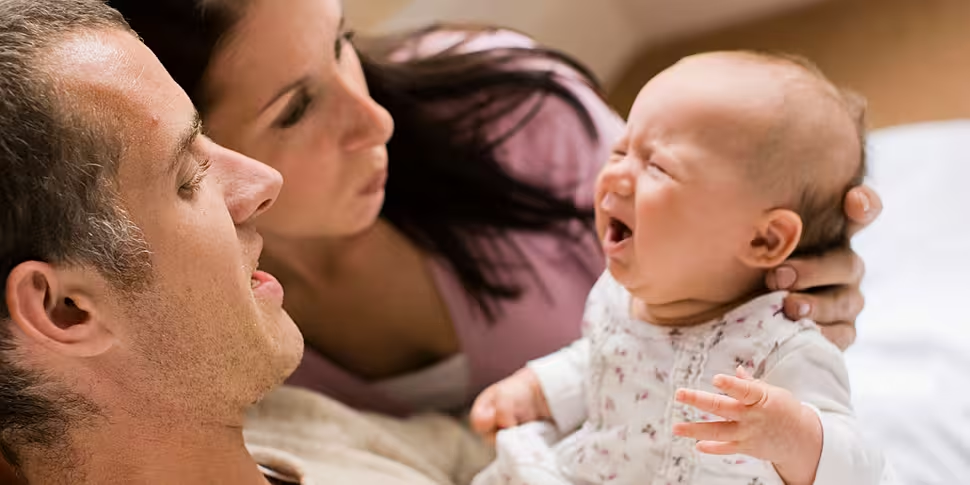More parents need to talk about the pressures and struggles associated with having a child, a mother has said.
A Lunchtime Live listener got in touch to say they just had a baby seven weeks ago and were finding it "extremely tough going".
"She cries a lot, she's not colic, she eats really well, she is growing well," they said.
"But we are actually really struggling and particularly my wife".
GP Dr Nina Byrnes said it is a big adjustment for parents.
"The first few weeks of having a baby you're getting to know the baby and they're getting to know you," she said.
"Babies do cry a lot and they cry for various reasons and in the first few weeks you're really getting to know each other [and] getting to know their various cries.
"It's important to make sure the baby's healthy, which it sounds like they have done, but always check in with the doctor if you think they're crying more than most other babies".
'The euphoria wears off'
Eilish in Meath told the show the topic really resonates with her.
"I've had three children and on every single one of them in the six weeks [after leaving hospital] I nearly just lost it," she said.
"You are tired, you're just exhausted from everything, the euphoria has kind of warn off a little bit.
"You're anxious sometimes, I felt lonely - so it's really difficult time".
Eilish said she thinks more mothers need to talk about it.
"It's another kind of taboo where women don't openly talk about it because we have this lovely baby but we are feeling absolutely alone sometimes with that," she said.
"We're only openly talking about menopause and miscarriage and maybe this is something that we should start openly talking about as well.
"When you talk to other women they have felt the exact same thing where you're struggling.
"It's not easy to admit [that] I'm not coping at the moment but most women will have those emotions and feelings".
'From Lads to Dads'
Jamie in Dublin said he joined a support group after becoming a father.
"A lot of men don't get the message out there and say they have issues with this stuff," he said.
"The early stages is very overwhelming, especially for the mother and the child, but for the men as well: they feel isolated.
"During COVID I joined a group called From Lads to Dads and they just have platforms there to talk about all this stuff".
Jamie said the group has Zoom meetings once a month.
"They do baby first aid, they do all this antenatal stuff in the early stages which is great for guys because - as you know - men don't talk enough," he said.
"It's just good to have a space for us."
Jamie said he believes fathers need to bond more with their children.
"The women go through the nine months of pregnancy so they have that initial maternal thing in them," he said.
"So I think with men [they should] spend as much time as you can and just sit in with it because it does pass".
'Realities of the fourth trimester'
Infant Feeding Specialist Katie Mugan told the show there are issues across the board.
"In the antenatal classes a lot of it is dealing with the labour and the birth and immediate postnatal care," she said.
"But very few discuss the realities of the fourth trimester for parents.
"Having a new baby is a life-changing milestone in anyone's life and it's a huge transition.
"You bring home this little person into your world and you're excited and exhilarated; but it's exhausting [and] overwhelming at times as well".
Ms Mugan said some parents do not see an improvement after six weeks.
"They're now fatigurd post-six weeks, they feel isolated, they feel overwhelmed," she said.
"They feel like they're nearly the only ones because we don't speak about it enough".
Social media
Ms Mugan warned parents against comparing their lives to others on social media.
"Some women will bounce back, they've got a fantastic figure, and that's them - but it's not transferable to every mother," she said.
"You see parents that have the babies dressed perfectly, their house is in perfect shape and that's often not the case.
"When you look behind the cameras that's not the reality for most... when people are posting these things on social media it is a second in somebody's life."
Ms Mugan said that many parents having children later in life means families may not be in a position to help.
"Many [people] are living away from family... they're living in big, suburban, built-up areas [and] they wave to their neighbors," she said.
"But very few know their community".
Ms Mugan added that it's important to find "a support network outside of what you once had, especially if you're the first out of all your friends to have a baby".
Anyone affected by issues raised in this article can contact Parentline on 01 8733 500









